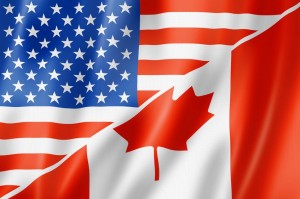Rules Are for Schmucks: Canada 1, USA 0

The headline may sound like a hockey score, but what follows is a little more serious than that. It is a score of how the Supreme Courts of these two neighbors have dealt with the important issue of institutionalized prayer at government meetings.
One year ago this week, the US Supreme Court in Town of Greece v. Galloway approved sectarian prayer to open meetings of the town council of Greece, New York. The decision was five to four, but as I discussed at the time, all nine of the American justices supported the general concept of permitting official prayer at the commencement of local government meetings. The only difference between the majority and the minority was that the minority insisted that the prayer not be uniformly sectarian. According to Justice Kagan’s dissent, either a bland “generic” prayer would be ok or a rotation of prayers from different flavors of religion would be ok, but a traditional Christian prayer before every meeting would not be ok. That was the “liberal” dissent – the majority opinion of Justice Kennedy was not troubled at all by the town’s history of Christian-only prayer. Not one member of the court expressed the slightest concern over the exclusionary effect that prayer of any kind has on the rapidly growing minority of nonbelievers.
Going zero-for-nine almost (but not quite) made me wonder whether I’m the one who’s crazy and whether the idea that government meetings ought to be religion-free is simply eccentric. My worries ended last month, though, when I learned that the Supreme Court of Canada unanimously took exactly the position that not a single member of our court had the good sense to espouse.
In Movement Laique Quebecois v. Saguenay, by a vote of nine to zero, Canada’s Supreme Court told the city of Saguenay that its council must cease the practice of reciting a prayer before each of its meetings. The prayer at issue was brief and almost certainly would have passed Justice Kagan’s standard of blandness:
“Almighty God, we thank You for the great blessings that You have given to Saguenay and its citizens, including freedom, opportunities for development and peace. Guide us in our deliberations as City Council members and help us to be aware of our duties and responsibilities. Grant us the wisdom, knowledge and understanding to allow us to preserve the benefits enjoyed by our City for all to enjoy and so that we may make wise decisions. Amen.”
The court’s reasoning is so refreshingly simple as to seem naïve, at least for someone used to reading American court decisions. Government, at least in Canada, is said to have a “duty of neutrality” with regard to religious belief. “The state may not act in such a way as to create a preferential public space that favours certain religious groups and is hostile to others. It follows that the state may not, by expressing its own religious preference, promote the participation of believers to the exclusion of non-believers or vice-versa.”
This conclusion was reached despite the fact that the preamble to Canada’s charter begins with “Whereas Canada is founded upon principles that recognize the supremacy of God and the rule of law…” The US constitution, by contrast, is pointedly silent about God. Nonetheless, even Justice Kagan’s dissent in Town of Greece defends prayers before government meetings as:
“…statements of profound belief and deep meaning, subscribed to by many, denied by some. They ‘speak of the depths of [one’s] life, of the source of [one’s] being, of [one’s] ultimate concern, of what [one] take[s] seriously without any reservation.’ If they (and the central tenets of other religions) ever become mere ceremony, this country will be a fundamentally different—and, I think, poorer—place to live.”
Where does that leave American nonbelievers? Nowhere. According to Kagan, “We are a religious people.” Those of us who are not religious are not part of Kagan’s “we” (except when it’s time to pay the taxes that cover her salary.) In Canada, though, nonbelievers are treated like real citizens, with real rights. Its court says that “the state must not interfere in religion and beliefs. The state must instead remain neutral in this regard, which means that it must neither favour nor hinder any particular belief, and the same holds true for non-belief [emphasis added].” According to the Canadian court, the prayer before Saguenay council meetings:
“…turned the meetings into a preferential space for people with theistic beliefs. The latter could participate in municipal democracy in an environment favourable to the expression of their beliefs. Although non-believers could also participate, the price for doing so was isolation, exclusion and stigmatization. This impaired [plaintiff’s] right to exercise his freedom of conscience and religion. ”
Similarly, in Town of Greece, the plaintiffs testified that the prayers “gave them offense and made them feel excluded and disrespected.” Too damn bad, said Justice Kennedy, because “Offense, however, does not equate to coercion.”
The facts that the Saguenay prayer was so bland, and that it was nearly identical to the prayer recited at the opening of the Canadian House of Commons, impressed the judges not at all: “Even if a religious practice engaged in by the state is ‘inclusive,’ it may nevertheless exclude non-believers.” Not only did Canada’s court ban future official prayers at council meetings, it even upheld an award of $30,000 in compensatory and punitive damages for the nonbelieving plaintiff for having to endure official “isolation, exclusion and stigmatization.” If I ever hear of a US court standing up for nonbelievers that way, I’ll pinch myself because I’ll know I must be dreaming.
All is not lost, though. The USA can still beat Canada in hockey.
